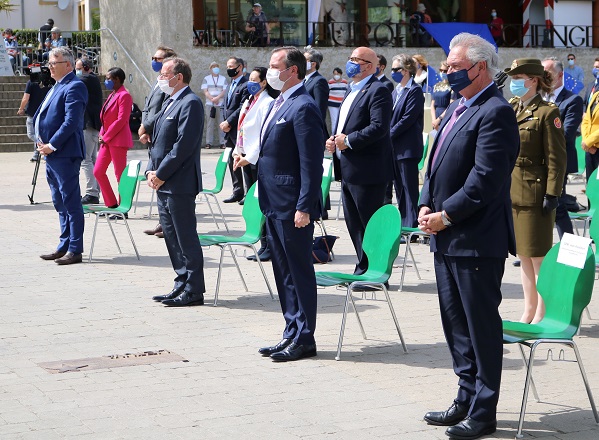 L-R: Nicolas Schmit, European Commissioner; Fernand Etgen, President of the Chamber of Deputies; HRH the Hereditary Grand Duke; Jean Asselborn, Luxembourg's Minister of Foreign and European Affairs;
Credit: MAEE
L-R: Nicolas Schmit, European Commissioner; Fernand Etgen, President of the Chamber of Deputies; HRH the Hereditary Grand Duke; Jean Asselborn, Luxembourg's Minister of Foreign and European Affairs;
Credit: MAEE
On Sunday 9 May 2021, Luxembourg and other European Union (EU) member states celebrated Europe Day.
In addition to various events, such as an online discussion with politicians and activists, organised by the European Parliament Liaison Office in Luxembourg and the Representation of the European Commission in Luxembourg, official celebrations took place in Schengen. Among those present were His Royal Highness the Hereditary Grand Duke, Luxembourg's Minister of Foreign and European Affairs, Jean Asselborn, the European Commissioner for Jobs and Social Rights, Nicolas Schmit, and the President of the Chamber of Deputies (Parliament), Fernand Etgen.
The celebrations focused on 70 years of peace and solidarity in Europe since the Schuman Declaration of 9 May 1950.
In his speech, Luxembourg's Foreign Minister stressed the importance of Schengen and of free movement in Europe, especially during a health crisis. He explained: “This crisis has highlighted a very particular vulnerability: that of cross-border communities. For decades, these communities have experienced Europe without borders on a daily basis. We have succeeded, with a common effort, in establishing a cross-border way of life in recent decades, economically, culturally and above all human".
Minister Jean Asselborn recalled that Luxembourg wishes to ensure the preservation of free movement within the EU, which is the symbol of the Union and our freedoms, and which has become one of the conditions for solidarity and prosperity.
Europe Day was also an opportunity to look to the future, as it marks the official launch of the Conference on the Future of Europe. The Conference is structured around several major themes: climate change and the environment; health; a stronger and fairer economy; social justice and employment; the EU on the international scene; values and rights, rule of law, security; digital transformation; European democracy; migration; education, culture, youth and sport.
In the coming months, debates, conferences and other events on the future of Europe will be organised in all EU Member States, either face-to-face or remotely depending on the health context. Conclusions will be presented in spring 2022.








